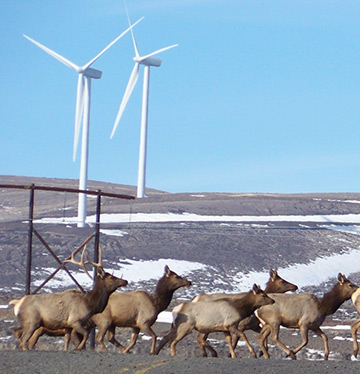PSE is protecting wildlife and habitat
Through our conservation and restoration efforts, we help sustain valuable habitats that support significant wildlife populations.
Central Washington shrub-steppe
The rain shadow of the Cascade Mountains creates a semi-arid habitat known as shrub-steppe. Over the past 150 years, half of this dry, native ecosystem in Central Washington has become farmland, making shrub-steppe among the most threatened ecosystems in North America. When constructing the Wild Horse Wind and Solar Facility, we voluntarily added a conservation easement to safeguard 7,000 acres of shrub-steppe habitat. By planting 6,500 sagebrush plugs, we helped restore the area to a viable ecosystem for loggerhead shrikes, ground squirrels, sage grouse and the sensitive hedgehog cactus.
In partnership with the Trust for Public Lands and the Washington Department of Fish and Wildlife, we also preserved 18,000 acres of undeveloped open space, helping to maintain enough wild lands to support elk, mule deer, bobcats, badgers, hawks and other wildlife — all told, more than 200 bird species and 30 mammal species.
The White River
Urbanization has taken a toll on Puget Sound open space, encroaching on watersheds and native riparian habitat. Along the White River, where PSE operated a hydroelectric facility for much of the 20th century, we set aside approximately 1,900 acres of our own land (undeveloped forest, wetlands, bluffs and meadows) along a 10-mile stretch of the river — one of the few large tracts of undeveloped property left in the lowlands of central Puget Sound. Our effort preserves habitat for bears, deer, cougars, great blue herons, wood ducks and other species.
North Cascades elk habitat
PSE's Baker River Hydroelectric Project is situated within the heavily forested Cascade Range of northwest Washington. Under our new operating license for the project, we acquired nearly 800 acres of prime habitat near Concrete to set aside for the area's Nooksack elk herd. The property's forest and meadows are also home to blacktail deer, black bears and a host of other wildlife, including amphibians, raptors and migratory birds.
Noxious weed management
Invasive and noxious weeds can crowd out native plants, degrade habitats and increase harmful erosion. We strive to control these species through an ecologically based, integrated weed management program at our facilities. We work with local environmental organizations to help identify and manage the weeds, then reintroduce native plants to restore the habitat.









